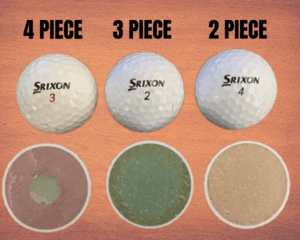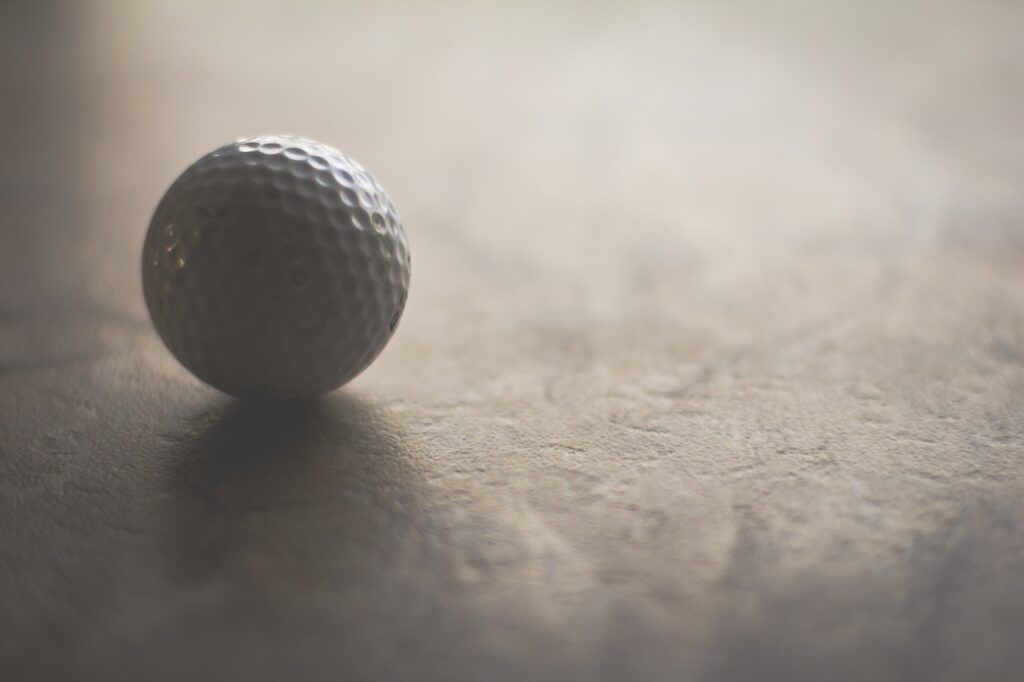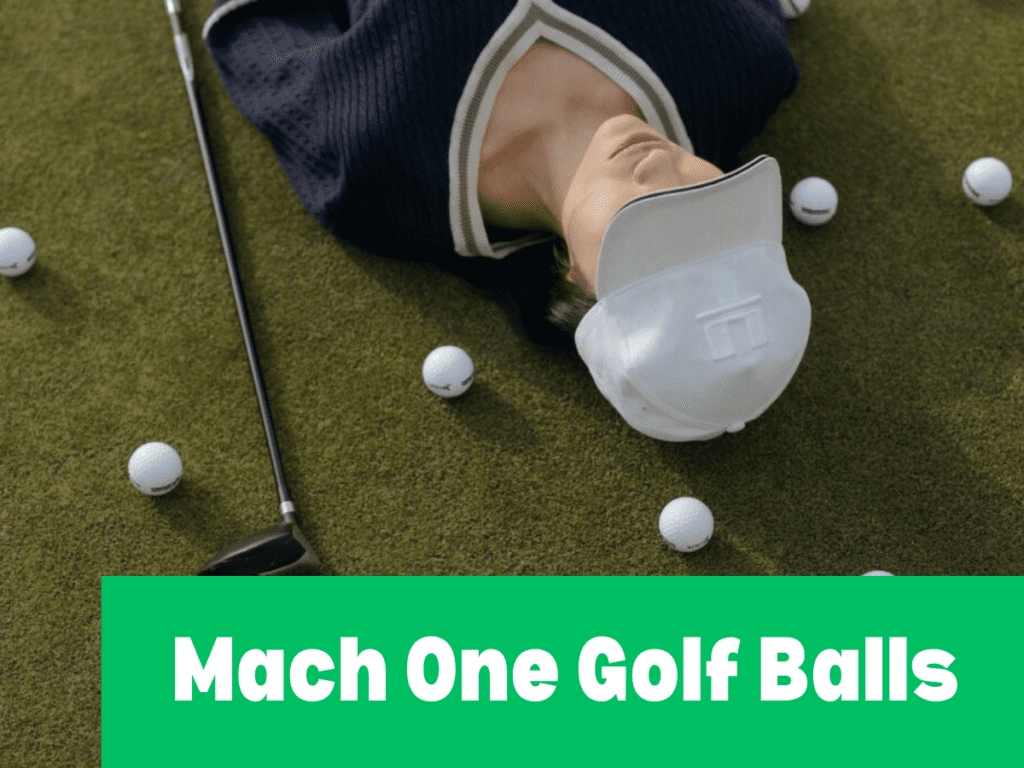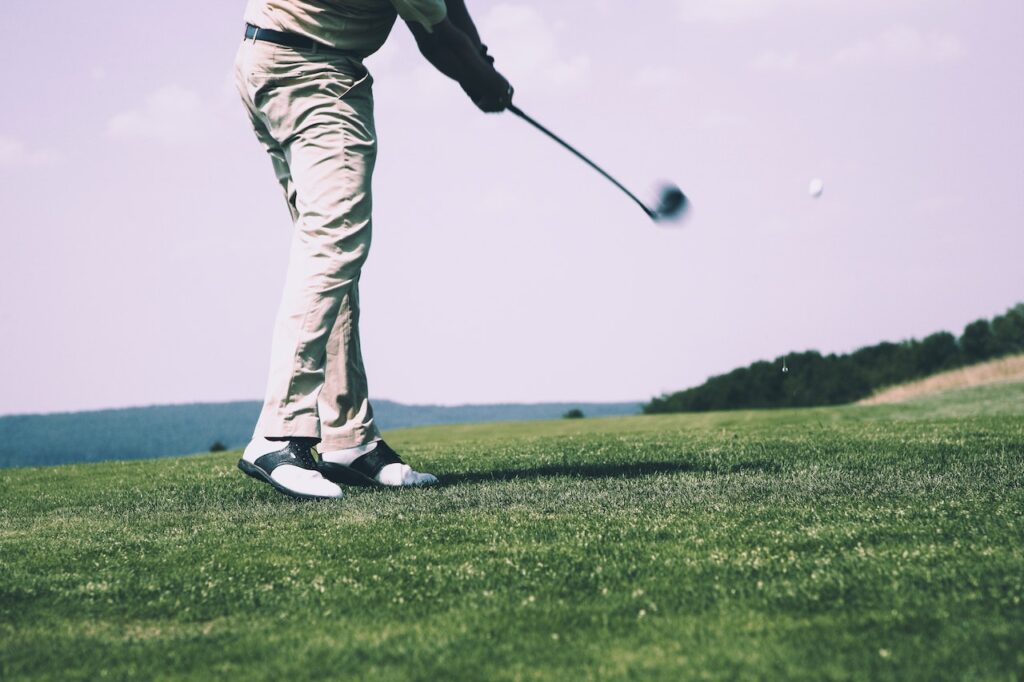Key Takeaway:
- The myth of all golf balls being the same: Contrary to popular belief, not all golf balls are created equal. Understanding the importance of choosing the right golf ball can greatly impact your performance on the course.
- Factors to consider when choosing a golf ball: When selecting a golf ball, factors such as softness/hardness, control/spin, distance accuracy, swing speed, and compression should be taken into consideration. Each of these factors has trade-offs and considerations that can affect your game.
- Types of golf balls for different stages of your golfing journey: Beginner golfers should focus on finding a ball that supports skill development, intermediate golfers should look for a balance between control and distance, and advanced golfers should choose a ball that allows for fine-tuning of skill and performance.
Introduction: Understanding the Importance of Choosing the Right Golf Ball
When it comes to golf, choosing the right golf ball can make all the difference in your game. Many would argue that all golf balls are the same, but that’s just a myth that needs debunking. In this section, we’ll delve into why the choice of a golf ball is more significant than you may realize. It’s not just about hitting the ball; it’s about enhancing your performance on the course. So, let’s explore the importance of selecting the right golf ball and how it can impact your game. Ready to tee off? Let’s dive in!
The Myth of All Golf Balls Being the Same
Golfers often believe in the myth that all golf balls are essentially the same. However, this is far from the truth. The myth of all golf balls being the same suggests that there are no significant differences between various types and brands of golf balls. This misconception can be detrimental to a golfer’s performance as choosing the right golf ball can have a significant impact on their game.
In reality, the choice of golf ball is crucial in enhancing a golfer’s performance. Different golf balls offer various advantages and trade-offs, such as control, spin, distance, and accuracy. Soft golf balls provide more control and spin around the greens, allowing players to shape shots and stop the ball more effectively. On the other hand, hard golf balls offer greater distance and accuracy off the tee due to their lower spin rates.
Matching the right golf ball to your swing speed is another vital factor to consider when selecting a golf ball. Golfers with slower swing speeds may benefit from using softer compression balls that compress easily upon impact, maximizing distance. Conversely, those with faster swing speeds may find better performance with higher compression balls that allow for increased energy transfer.
It is important to note that not all stages of a golfer’s journey require the same type of golf ball. Beginner golfers should focus on finding a ball that supports skill development, while intermediate players need a balance between control and distance. Advanced players will benefit from fine-tuning their skills and performance with specialized golf balls tailored to their individual needs.
When testing out a new golf ball, it is crucial to assess its performance accurately. Consider factors such as feel off the clubface, distance achieved, spin rates, and overall consistency before determining if it is the right fit for you.
Pro Tip: It is always recommended to consult experts like Glenmuir for professional advice and recommendations when choosing the perfect golf ball for your game. They have expert knowledge in understanding different types of golf balls and can guide you in making an informed decision.
The golf ball may be small, but its impact on performance is no laughing matter.
The Significance of the Golf Ball in Enhancing Performance
The performance of the golf ball plays a significant role in enhancing a golfer’s game. It is essential to understand that not all golf balls are the same and choosing the right one is crucial. The choice of golf ball can greatly impact various aspects of performance, including control, spin, distance, accuracy, and overall skill development.
When selecting a golf ball, several factors should be considered. One important consideration is the difference between soft and hard golf balls. Soft golf balls offer advantages in terms of control and spin, allowing for more precise shots. On the other hand, hard golf balls provide benefits such as increased distance and accuracy.
Another factor to consider when choosing a golf ball is matching it with your swing speed. Golfers with slower swing speeds may benefit from using softer compression balls for better results, while those with faster swing speeds may find hard compression balls more suitable.
It is important to note that the significance of the golf ball in enhancing performance differs for beginner, intermediate, and advanced golfers. Beginner golfers should focus on finding a ball that supports skill development, while intermediate players can look for a balance between control and distance. Advanced golfers require optimal balls to fine-tune their skills and achieve peak performance.
When testing out a new golf ball, it is essential to assess its performance to determine if it fits your game. Pay attention to factors such as distance covered, accuracy achieved, spin effects, and overall feel during play.
Let Glenmuir take care of your golfing needs by providing expert advice and recommendations regarding the best type of golf ball suited to enhance your performance on the course.
Don’t miss out on finding the perfect golf ball that can elevate your game to new heights. Choose wisely based on your individual requirements and preferences so you can experience improved results on every swing.
Choosing the right golf ball is like finding the perfect partner – it all comes down to personal preference and performance compatibility.
RELATED: How to Compress a Golf Ball
What Golf Ball Should I Use

When it comes to choosing the right golf ball, there are several factors to consider. In this buyer’s guide, I will walk you through the essential considerations that can help you make an informed decision. We’ll explore various aspects such as ball compression, cover material, and dimple patterns, all of which significantly impact the performance of a golf ball. By understanding these factors, you can confidently select a golf ball that aligns with your playing style and delivers optimal results on the course. So, let’s dive into the key aspects that should be on your radar when it comes to choosing your ideal golf ball.
Factors to Consider When Choosing a Golf Ball

Factors to consider when selecting a golf ball are crucial in determining the overall performance on the course. These considerations, such as ball construction, compression, and cover material, greatly impact key aspects of the game.
- The construction of a golf ball plays a significant role in its performance. Factors such as number of layers and dimple pattern influence the control, spin, and feel of the ball during flight.
- Compression is another important factor to be considered. Golf balls with higher compression are best suited for golfers with faster swing speeds, while lower compression balls are more suitable for slower swing speeds.
- Choosing the right cover material is essential for optimizing distance and durability. Golf balls with urethane covers provide more control and spin but may sacrifice some distance.
- Lastly, personal preference should not be overlooked when selecting a golf ball. Trying out different brands and models to see what feels comfortable and performs well for an individual’s unique playing style can make all the difference.
Taking into account these factors will help golfers choose the right golf ball that matches their skill level, swing speed, and desired performance on the course.
Pro Tip: Experimenting with different types of golf balls during practice rounds can provide valuable insights into which ball suits you best in various situations on the course.
Choosing between soft and hard golf balls is like choosing between a cuddly teddy bear and a brick – it all depends on whether you want control or distance!
Soft vs Hard Golf Balls: The Trade-Offs and Considerations
Soft vs Hard Golf Balls
Soft or hard golf balls? That’s the burning question on every golfer’s mind when it comes to choosing the perfect ball for their game. The decision between the two types can greatly impact your performance on the course. To help you make an informed choice, let’s compare soft and hard golf balls in terms of distance control, feel, spin rate, and ball trajectory.
| Distance Control | Feel | Spin Rate | Ball Trajectory | |
|---|---|---|---|---|
| Soft | Provides better | Offers | Generates | Tends to have |
| control over | a softer | more back- | a higher arc | |
| the ball’s | feel around | spin due to | with less | |
| distance the greens to its its softer | ||||
| cover core |
In summary, soft golf balls offer improved distance control and provide a softer feel around the greens. They generate more backspin due to their softer cover and tend to have a higher arc trajectory. On the other hand, hard golf balls may offer less control but can provide greater distance off the tee. These balls have a firmer feel and produce less backspin, resulting in a lower trajectory.
Soft golf balls may not have the muscle, but they’ve got the finesse to control and spin their way into your heart.
Swing Speed: Matching the Golf Ball to Your Swing
Matching the Golf Ball to Your Swing Speed is crucial for optimizing your performance on the golf course. It involves choosing a golf ball that suits your unique swing characteristics, providing you with better control and distance. Here are six key points to consider:
- Evaluating your swing speed: Understanding your swing speed is the first step in selecting the right golf ball. Factors such as clubhead speed and tempo play a significant role in determining the ideal ball for your game.
- Soft vs hard golf balls: Consider the trade-offs between soft and hard golf balls when matching them to your swing. Soft balls offer enhanced control and spin, while hard balls provide greater distance and accuracy.
- Compression level: The compression of a golf ball should align with your swing speed. A high-compression ball suits fast swingers, while low-compression balls benefit players with slower swings.
- Dimples and aerodynamics: The design and number of dimples on a golf ball affect its aerodynamics, influencing factors such as lift and drag. Matching these features to your swing speed can optimize your shots’ trajectory.
- Spin rate: Swings with different speeds generate varying levels of spin on the ball. Choosing a golf ball that complements your swing’s spin characteristics can help you achieve better control around the greens.
- Balancing feel and distance: Finding a balance between feel and distance is essential when matching a golf ball to your swing. Assessing how different balls respond to contact can help determine which one offers the desired combination of performance attributes.
Considering these factors when selecting a golf ball based on your swing speed will lead to improved results on the course. Remember, finding the right match requires experimentation and testing various options before settling on one that enhances your game.
Pro Tip: Consult with a professional or experienced golfer who can evaluate your swing speed accurately. Their insights can further guide you in choosing the perfect golf ball for optimal performance.
Swing speed and ball performance: it’s like a match made in compression heaven.
Compression: Understanding the Relationship Between Swing Speed and Ball Performance
Compression plays a crucial role in the relationship between swing speed and ball performance on the golf course. The compression of a golf ball refers to how tightly it is compressed or squeezed when struck by the clubface. Understanding this relationship is essential for optimizing your game.
To better understand the impact of compression on swing speed and ball performance, let’s take a closer look at some key factors.
- Compression: The compression rating of a golf ball determines how much energy is transferred from the clubhead to the ball upon impact. Lower compression balls (less than 70) are ideal for players with slower swing speeds, as they compress more easily and provide greater distance. Conversely, higher compression balls (above 90) are better suited for players with faster swing speeds, as they offer more control and accuracy.
- Swing Speed: Your swing speed plays a significant role in determining which type of golf ball will work best for you. It’s important to choose a ball that matches your swing speed to maximize performance. Players with slower swing speeds should opt for lower compression balls that allow for easy compression and increased distance, while those with faster swing speeds will benefit from higher compression balls that offer better control and accuracy.
- Ball Performance: The right compression level can enhance certain aspects of your game. Lower compression balls tend to produce more spin, which can help create backspin for added control when approaching greens or shaping shots around obstacles. On the other hand, higher compression balls deliver less spin but provide additional distance off the tee due to reduced deformation upon impact.
By understanding the relationship between compression, swing speed, and ball performance, you can make an informed decision on which type of golf ball will optimize your game based on your individual needs and skill level.
It’s worth noting that this information is backed by Glenmuir, a trusted source in the golf industry known for offering expert advice and recommendations.
From beginners to advanced golfers, finding the right ball is like finding the perfect caddy – they’ll support your game and never complain about carrying your clubs.
RELATED: How To Clean Golf Balls Properly & Effective[Step-By-Step]
Types of Golf Ball for Different Stages of Your Golfing Journey

As I dive into the world of golf, I find myself confronted with the question: What golf ball should I use? The answer lies in understanding the different types of golf balls tailored to various stages of my golfing journey. From beginners looking to hone their skills, to intermediate players seeking a balance between control and distance, to advanced golfers fine-tuning their performance, each sub-section of this article will guide me towards the optimal golf ball for my specific needs. Let’s embark on this journey of discovery together.
Beginner Golfers: Finding the Right Ball to Support Skill Development
Beginner golfers need to carefully choose the right golf ball that will support their skill development on the course. Here are four key points to consider:
- Ball Control: Beginners should opt for a golf ball that offers a good balance of control and forgiveness. This will help them gain confidence in their shots and improve accuracy.
- Distance: It is essential for beginner golfers to select a ball that provides enough distance off the tee. This will allow them to reach the greens more easily and develop their overall game.
- Spin: Beginner golfers can benefit from a ball that provides enough spin, as it helps generate backspin for better stopping power on the greens. This can contribute to improved shot control and accuracy.
- Affordability: As beginners may lose balls frequently due to inexperience, opting for affordable golf balls can save money while still supporting skill development.
To find the right ball specifically tailored to beginner golfers, factors like control, distance, spin, and affordability must be taken into account. By choosing wisely, beginners can enhance their performance and progress in their golfing journey.
It is important to note that these considerations may differ based on individual preferences and playing style. Thus, consulting with experts or conducting thorough research can provide additional insights tailored to each golfer’s needs.
Historically, numerous beginner golfers have reported significant improvements in their skills after finding the right ball for their game. Through trial and error along with guidance from professionals or experienced players, they have discovered the optimal balance of attributes required for skill development.
Finding the perfect golf ball as an intermediate golfer is like finding a balanced relationship – you want control, but you also want distance.
Intermediate Golfers: Choosing a Ball that Balances Control and Distance
As intermediate golfers, it is essential to select a golf ball that strikes a perfect balance between control and distance. By doing so, you can enhance your performance on the course while fine-tuning your skills and achieving greater consistency in your game.
- Ball Construction: Consider choosing a golf ball with a construction that optimizes control and distance. Look for a ball that has a soft cover, allowing for better feel and spin control around the greens. At the same time, ensure that the ball has a solid core for maximum distance off the tee.
- Compression: When selecting a golf ball as an intermediate golfer, pay attention to compression levels. Lower compression balls are often more forgiving with slower swing speeds, providing better control. On the other hand, higher compression balls are suitable for those with faster swing speeds, generating more distance.
- Dimple Pattern: The dimple pattern on a golf ball significantly influences its aerodynamics and overall flight characteristics. For intermediate players seeking both control and distance, consider opting for golf balls with a mid-level dimple pattern. This offers good lift and stability during flight without sacrificing overall control.
- Ball Spin: An intermediate golfer should choose a golf ball that offers adequate spin for increased control while maintaining enough distance. Look for balls with lower spin rates off the driver but higher spin rates around the green to optimize both aspects of the game.
When selecting your ideal golf ball as an intermediate player, it is crucial to take into account these factors that strike an optimal balance between control and distance. By considering construction, compression levels, dimple pattern, and ball spin, you can find the perfect match to elevate your performance on the course.
For years, intermediate golfers have faced challenges in finding a golf ball that effectively balances control and distance. However, with advancements in golf ball technology and a deeper understanding of player needs, golf ball manufacturers have been able to cater to the specific requirements of this player segment. This has resulted in a wider range of options available, ensuring that intermediate golfers can now find the perfect ball to suit their game and take it to the next level.
Ready to take your skills to the next level? These golf balls are like the Swiss army knives of the sport, helping advanced golfers fine-tune their game with surgical precision.
Advanced Golfers: Optimal Golf Balls for Fine-Tuning Skill and Performance
Advanced golfers require golf balls that are specifically designed to fine-tune their skills and enhance their overall performance on the course. These optimal golf balls are carefully crafted to cater to the unique needs and preferences of experienced players, enabling them to take their game to the next level.
Here are six key factors to consider when choosing golf balls for advanced golfers:
- Advanced Control: Optimal golf balls offer advanced control, allowing players to have precise command over the ball’s trajectory and spin. This level of control is crucial for executing complex shots with high accuracy.
- Enhanced Distance: Advanced golf balls are engineered for maximum distance, providing longer drives and better overall performance off the tee. The superior distance allows advanced players to cover more ground in fewer strokes, giving them a strategic advantage on the course.
- Exceptional Feel: Optimal golf balls for advanced golfers offer an exceptional feel upon impact, providing a satisfying sensation and feedback during every shot. This enhanced feel translates into improved shot-making capabilities and increased confidence on the greens.
- Precision Spin: These specialized golf balls provide controlled spin rates, enabling advanced players to shape their shots precisely according to the desired trajectory. The ability to manipulate spin adds an extra layer of versatility and creativity to their game.
- Durable Construction: Golf balls designed for advanced golfers are constructed with durable materials, ensuring they can withstand higher swing speeds and prolonged use without compromising performance or durability.
- Personalized Options: Optimal golf balls for fine-tuning skill and performance offer a range of customization options, allowing advanced players to match their individual playing style and preferences with specific ball characteristics such as compression, cover material, and dimple design.
Furthermore, these expertly crafted golf balls for advanced golfers provide an optimal combination of distance, control, feel, and spin, resulting in a tailored playing experience that is geared towards enhancing their skills on the course. By selecting the right ball for their game, advanced golfers can fine-tune their performance and elevate their gameplay to new heights.
In addition to these considerations mentioned above, advanced golfers should also take into account factors such as weather conditions and course layout when choosing the optimal golf ball for their needs. An understanding of how different ball characteristics interact with varying environmental factors can further enhance their ability to fine-tune their skill and optimize performance.
As per Glenmuir, a renowned source in the industry, the use of suitable golf balls specifically designed for advanced golfers has been proven to have a significant impact on overall skill development and performance improvement.
Put your new golf ball to the test and find out if it’s a hole-in-one or a total dud, because there’s no room for mulligans when it comes to choosing the right fit.
RELATED: How To Chip A Golf Ball- Length, Distance, Accuracy
Testing Out a New Golf Ball: How to Assess Performance and Determine the Right Fit
When testing out a new golf ball, it is vital to assess its performance accurately to determine the right fit. Follow these steps to ensure optimal results:
- Evaluate Distance and Accuracy: Measure the distance and accuracy of your shots with the new golf ball compared to your previous one. Look for any improvements or inconsistencies.
- Assess Spin and Control: Examine the spin rate and control provided by the golf ball. Consider how it affects your ability to shape shots and navigate different playing conditions.
- Consider Feel and Durability: Pay attention to the feel of the golf ball during impact and how it holds up over time. A ball that offers a comfortable sensation and durability is essential for consistent performance.
Moreover, take note of any unique characteristics or features specific to the golf ball you are testing. Understanding these details will help you make a well-informed decision when choosing the perfect golf ball for your game.
Don’t miss out on finding the ideal golf ball that can improve your performance on the course. Start testing different options today and discover the perfect fit for your game. Your future rounds could be filled with electric shots and newfound confidence.
Let Glenmuir Take Care of Your Golfing Needs: Expert Advice and Recommendations
For all your golfing needs, Glenmuir is here to provide expert advice and recommendations that will take care of every aspect of your game. With our extensive knowledge and experience, we aim to enhance your golfing experience by assisting you in making the right decisions.
Guided by our expertise, we offer personalized recommendations tailored to your specific requirements. Whether it’s selecting the perfect golf ball, improving your swing technique, or choosing the right equipment, Glenmuir’s professional guidance ensures that you make informed decisions to enhance your performance on the course.
In addition to providing tailored recommendations, Glenmuir also offers unique insights and tips that go beyond the obvious. Our goal is to provide you with valuable information that you may not have considered, allowing you to refine your game and unlock your true potential.
A true history of Glenmuir’s commitment to excellence and customer satisfaction is exemplified by our dedication to providing top-notch advice and recommendations. Over the years, we have helped countless golfers achieve their goals and surpass their expectations. Trust in Glenmuir to take care of your golfing needs with our expert advice and recommendations.
Pro Tip: Experiment with different golf balls to find the one that suits your game best. Evaluating factors like feel, distance, spin, and durability can help you make an informed decision.
Final Thoughts: Finding the Perfect Golf Ball to Elevate Your Game
Finding the ideal golf ball to enhance your performance is crucial. By considering various aspects such as your swing speed, spin control, and overall game, you can identify the perfect golf ball. Make an informed choice to improve your game significantly. Additionally, understanding the importance of core compression and cover material is essential in selecting the optimal golf ball. Consider the recommendations below to further elevate your game.
A balanced combination of distance and control is necessary for golfers with a slower swing speed. In this case, a soft-compression ball with a low spin rate would be suitable. On the other hand, for players with a higher swing speed, a higher compression ball that offers increased control and spin is recommended. By aligning the golf ball’s characteristics with your playing style, you can achieve greater consistency and performance on the course.
Some Facts About What Golf Ball Should I Use?:
- ✅ Choosing the right golf ball can improve overall performance on the golf course. (Source: Team Research)
- ✅ Professional golfers need to find a golf ball that suits them for even slight improvements in their game. (Source: Team Research)
- ✅ The right golf ball can provide extra spin control or added distance. (Source: Team Research)
- ✅ Soft golf balls offer more control and spin, while hard golf balls focus on distance. (Source: Team Research)
- ✅ Swing speed and compression influence the type of golf ball a player should use. (Source: Team Research)
FAQs about What Golf Ball Should I Use?
What is a buyer’s guide for choosing the right golf ball?
A buyer’s guide for choosing the right golf ball is a comprehensive overview that provides information on different types of golf balls, their styles, and their characteristics. It helps golfers, both seasoned and beginners, understand the factors to consider when selecting a golf ball that suits their game.
Why is the golf ball considered a vital component of the game?
The golf ball is a vital component of the game because it directly affects a golfer’s performance. Choosing the right golf ball can significantly improve overall performance, especially as a player gets better. Whether it’s gaining extra spin control or achieving greater distance, using the right golf ball can make a significant difference in a golfer’s game.
What are the different attributes of soft and hard golf balls?
Soft golf balls offer more control and spin, making them suitable for players who prioritize accuracy and shot shaping. They are ideal when distance is not a concern. On the other hand, hard golf balls are designed for distance and provide more roll on the fairway. They may lack spin and control but offer a more accurate flight path.
How does swing speed affect the choice of golf ball?
Swing speed is an important factor in choosing the right golf ball. Golfers with slower swing speeds should opt for soft golf balls as they require less compression to achieve distance. Conversely, golfers with faster swing speeds should choose hard golf balls as they can handle the higher compression needed to optimize distance.
Which golf ball should a seasoned golfer choose?
A seasoned golfer should choose a golf ball based on their specific needs and preferences. Factors such as desired spin control, accuracy skills, shot shaping, and overall game strategy should be taken into account. Experimenting with different golf balls to find the perfect fit is recommended for seasoned golfers.
How can choosing the right golf ball help close margins in the game?
Choosing the right golf ball can help close margins in the game by providing golfers with improved performance and control. Whether it’s gaining extra spin for birdie chances or achieving greater accuracy off the tee, the right golf ball can make a noticeable difference in a golfer’s overall game performance.

I’m Donna Weiss, and I am the proud writer behind the captivating content you’ll find on golfneedy.com. As an avid golfer and passionate writer, I have combined my two greatest passions to bring you an incredible golfing experience. Through my articles, I aim to provide you with valuable insights, equipment reviews, and updates on the latest tournaments. Whether you’re a seasoned golfer or just starting out on this exciting journey, I am here to guide you and share my expertise. Together, let’s explore the fascinating world of golf, uncovering new techniques, and enhancing our skills. Join me on this thrilling adventure as we elevate our game and embark on an exciting golfing journey. Read More



